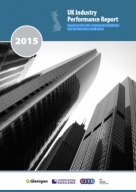2015 UK Industry Performance Report
On 17 September 2015, the annual UK Industry Performance Report based on the UK construction industry key performance indicators was published by Glenigan. The report was funded by the Construction Industry Training Board, supported by BRE SMARTWaste and endorsed by the Department of Business, Innovation and Skills and Constructing Excellence.
The report was based on construction projects completed during 2014. Some of its findings are summarised below:
- Project costs were on budget or better for 69% of projects, similar to 2013/14.
- Projects were on time or better 40% of the time, below the average of 45% in the years since 2003.
- Staff turnover increased to 5.3%, the highest since 2008.
- The proportion of women, people from black and minority ethnic backgrounds and those aged under 24, fell. The average proportion of women in the workforce fell from 19% to 13%, but this may be due to an increase in the number of site workers.
- Client satisfaction fell for the last three surveys.
- Ratings of service and value for money declined.
- Clients’ rating of consultancy teams was unchanged, remaining below previous peaks.
- Contractors’ satisfaction with clients and consults also fell.
- There were high levels of satisfaction with payment and information provision.
- Industry profitability rose to 2.8%, from 2.1% in the previous survey, but remained well below the 2009 peak of 9.9%.
- Projects became more environmentally efficient. Median energy use in construction was 199 kg CO2/ £100k project value, and the median project saw 21.6 m3 / £100k project value of waste removed from site.
- Building Information Modelling (BIM) was used on 13% of projects completed in 2014 compared to 9% in 2013 and 4% in 2012.
Stephen Radley, Director of Policy at CITB, said: “There are many positive results in this year’s report, but it shows there is no room for complacency. We welcome the return to growth, but project delays shows that the skills challenge is an issue for many across our industry.”
Allan Wilén, Economics Director at Glenigan, said: “The rapid upturn in activity during 2014 put pressure on capacity, manifesting itself in rising material and labour costs and extended delivery times. Evidence from this year’s KPIs suggests that construction firms have managed to keep control of costs, but delays to schedule have worsened… The construction industry is looking to a progressive growth in workload over the next few years. However the anticipated recovery presents fresh challenges: growing and up-skilling the workforce, delivering improved productivity and containing costs will be priorities.”
NB it is considered that the findings of the report may not be a full representation of the situation, as many of the projects competed during 2014 actually began during the depths of the recession.
Following publication of the report, CITB launched ‘Go Construct’, a new online service providing information about employment opportunities in the construction industry.
Featured articles and news
Gregor Harvie argues that AI is state-sanctioned theft of IP.
Many resources for visitors aswell as new features for members.
Using technology to empower communities
The Community data platform; capturing the DNA of a place and fostering participation, for better design.
Heat pump and wind turbine sound calculations for PDRs
MCS publish updated sound calculation standards for permitted development installations.
Homes England creates largest housing-led site in the North
Successful, 34 hectare land acquisition with the residential allocation now completed.
Scottish apprenticeship training proposals
General support although better accountability and transparency is sought.
The history of building regulations
A story of belated action in response to crisis.
Moisture, fire safety and emerging trends in living walls
How wet is your wall?
Current policy explained and newly published consultation by the UK and Welsh Governments.
British architecture 1919–39. Book review.
Conservation of listed prefabs in Moseley.
Energy industry calls for urgent reform.
Heritage staff wellbeing at work survey.
A five minute introduction.
50th Golden anniversary ECA Edmundson apprentice award
Showcasing the very best electrotechnical and engineering services for half a century.
Welsh government consults on HRBs and reg changes
Seeking feedback on a new regulatory regime and a broad range of issues.
CIOB Client Guide (2nd edition) March 2025
Free download covering statutory dutyholder roles under the Building Safety Act and much more.
























